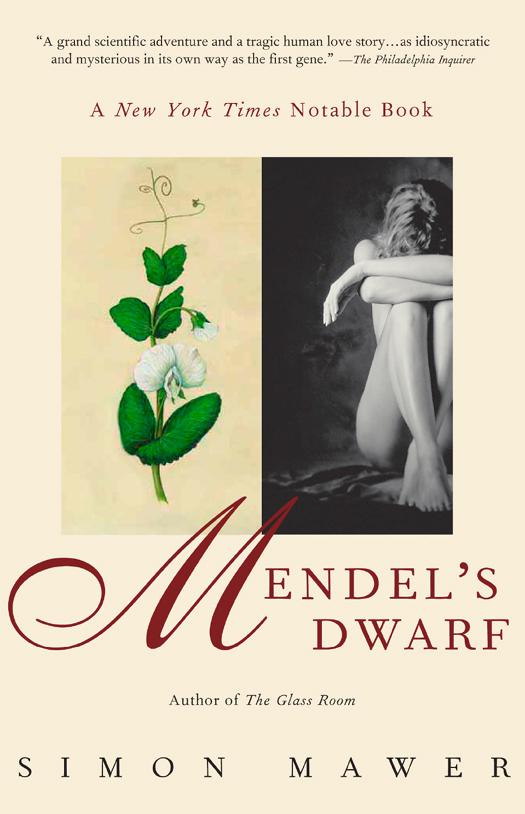
Mendel's Dwarf PDF
Preview Mendel's Dwarf
Like his great, great uncle, the early geneticist Gregor Mendel, Dr. Benedict Lambert is struggling to unlock the secrets of heredity. But Benedict's mission is particularly urgent and particularly personal, for he is afflicted with achondroplasia—he's a dwarf. He's also a man desperate for love. And when he finds it in the form of Jean—simple and shy—he stumbles upon an opportunity to correct the injustice of his own capricious genes.
As intelligent as it is entertaining, this witty and surprisingly erotic novel reveals the beauty and drama of scientific inquiry as it informs us of the simple passions against which even the most brilliant mind is rendered powerless.
Amazon.com ReviewDr. Benedict Lambert, the hero of Mendel's Dwarf, is very much a leg man, not that he has much choice in the matter. For the celebrated geneticist is a dwarf, a man resigned to being stared at for a little too long from some way up, and inured to bromides about inner beauty and outward bravery. As far as he's concerned, bravery requires choice--something he never had, since his father's sperm lacked "the command for height, for normality, for happiness and contentment." The beautiful swimmer did, however, pass on the genes for irony, sharp observation, and love, all of which Ben has in abundance in Simon Mawer's superb novel of academic twists and emotional turns.
A distant relative of the first geneticist, pea-pollinating Gregor Mendel, Ben has long used libraries as a refuge, and education as a way out (if not up). Still in his 20s, he's determined to identify the gene that made him "one of nature's practical jokes." Offered a post at the Royal Institute for Genetics, he immediately puts achondroplasia on the table. The director may well consider research into dwarfdom commercially unviable, but Ben knows better. His height will finally be of help: "There are lots of organizations interested," he insists. "The Little People of America, groups like that. When they see me coming they reach for their covenant forms."
Mawer interleaves Ben's research with the story of his affair (a "menage à une et demi") with the Institute's ill-fated assistant librarian, Jeane Piercey: "Mousy, of course. I feel that all librarians ought to be mousy. It should be a necessary (but not sufficient) qualification for the job. Mousy? Agouti? What, I wonder, is its genetic control? Perhaps it is tightly linked to the gene for tidiness." Mawer also juxtaposes Ben's passion with that of his legume-obsessed ancestor. Mendel, it turns out, pined for Frau Rotway, a married woman in the inevitable company of her own achondroplastic, a dachshund.
Mendel's Dwarf wears its considerable learning lightly--the author is a biologist--and readers will be alternately moved, charmed, and shocked by Ben's "astringent kiss of irony." Because the hero makes several difficult choices in the course of this fine novel, we admire his bravery, along with his resilience, at every turn. For Ben, the smallest gesture can become the largest (nods being "big absurd things, my head being about the same size as my body. You can't miss them. They are the gestural equivalent of screaming"). And alas, such acts are often poignantly beyond Ben's grasp: "I wanted to put my arm around her, of course, to bring her that fragile thing that we call comfort. But of course I couldn't reach."
From Library JournalBenedict Lambert, the protagonist of this imaginative and intelligent novel, is the great-great-great nephew of Gregor Mendel and a famous geneticist in his own right. He is also the dwarf of the title, obsessed with finding the marker for his condition and haunted by the all-too-easy assumptions/prejudices achondroplastics face when dealing with society at large. That a stunted body does not mean a stunted mind, feelings, or libido is brought clearly into focus through Lambert's relationship with a "mousy" librarian named Jean. Mawer weaves a story that is in turns compassionate, erotic, and angry. In telling Benedict's story, Mawer also tells that of Mendel, a genius who died unappreciated but who ultimately had a more important impact on the world than even Darwin. His discoveries provide the base for modern genetic research and the possibility of identifying markers for disease (and possibly cures), but they also raise the possibility of our being able to select particular physical characteristics for our offspring. The ethical and moral implications are obvious, particularly when brought into focus through someone whose own strain is likely to have no place in this brave new world. A wonderfully crafted, thought-provoking tale in which the science never gets in the way of the story; highly recommended.?David W. Henderson, Eckerd Coll. Lib., St. Petersberg, Fla.
Copyright 1997 Reed Business Information, Inc.
